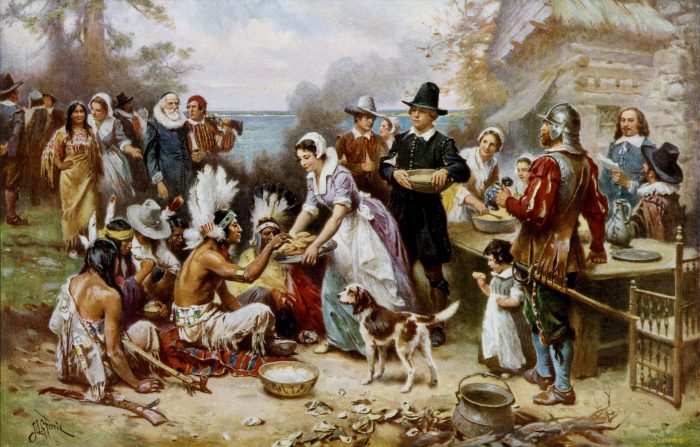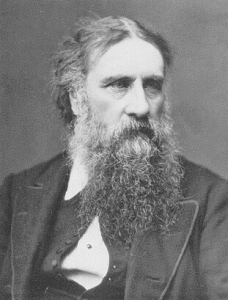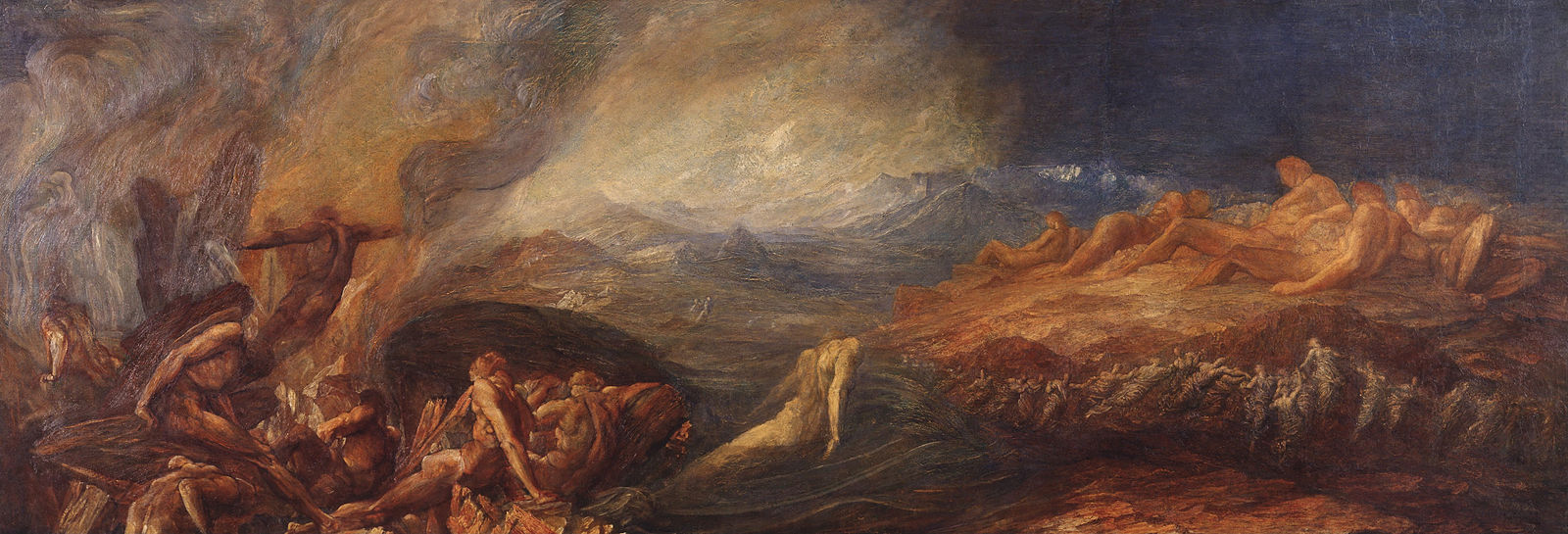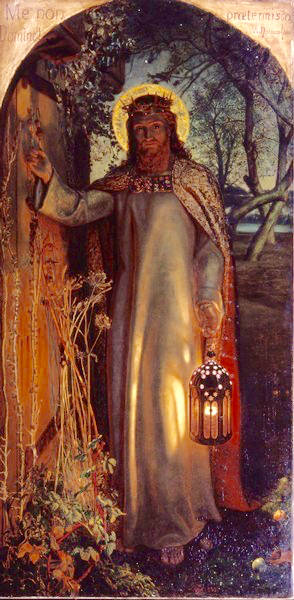We all live in ‘villages’—places defined by their boundaries, prejudices, preconceptions, and traditions. Jesus’s ministry was characterised by a fundamental opposition to these restrictive forces. Here we consider what it means to be set free by Christ.
They came to Bethsaida, and some people brought a blind man and begged Jesus to touch him. He took the blind man by the hand and led him outside the village. When he had spit on the man’s eyes and put his hands on him, Jesus asked, “Do you see anything?”
He looked up and said, “I see people; they look like trees walking around.”
Once more Jesus put his hands on the man’s eyes. Then his eyes were opened, his sight was restored, and he saw everything clearly. Jesus sent him home, saying, “Don’t even go into the village” (Mark 8:22–26).
Sight — correct vision — is Christ’s gift to his children. Since the first words of God — ‘let there be light’ — God has been working to give his children sight. These words were spoken by Christ at the dawn of time, for John in his gospel insists that ‘through him all things were made’ and furthermore, John also says that when Jesus came into the world, he was light incarnate – ‘the true light that gives light to everyone’. In a world of darkness — especially religious darkness — John’s first-hand witness statement declares that Jesus’s primary message was ‘God is light; in him there is no darkness at all’. Welcome news in a religious world that saw God as primarily judge and law-giver. ‘This vision of God as darkness,’ John is saying, ‘is wrong. You are seeing badly: God is light.’ Human vision regularly distorts reality. God gets the blame for all sorts of things, not least the mystery of evil — especially so when so many who claim to be representatives of ‘God’ walk in such evil and darkness. It seems to me that in these dark days we need to pray for the gift of sight, and this passage of Mark is worth exploring for it holds the key to new vision — 20/20 vision of reality. When Mark edited his gospel, it seems to me that like John — who included seven acts of Christ in his account, calling them ‘signs’, Mark included this incident for the deeper truth of which it speaks. I would like to consider this.
This blind man lived in a village. We all live in villages: those places where familiarity and predictability insulate us from the true nature of the world. Familiarity may not breed contempt, but it tends to breed complacency. Villages also breed preconceptions and prejudices as we tend to absorb the values of those around us, where through osmosis we unconsciously adopt the zeitgeist of our age. They are places where we cease to truly think, where ‘that’s how things are’. The unchanging familiarity of a village gives us comfort in a fast-changing world. But Jesus wants to take us by the hand and lead us out of our villages.
The problem is that we build up a false picture of reality. If one lives in a ‘communication village’ — only speaking to, and living with, people who are the same as oneself who share the same interests, beliefs, and values — sight soon becomes distorted. Eventually, as evidenced by those who would shoot a child in the head for wanting to go to school, blindness results. Blindness comes from assuming that our view of reality is true vision — even (perhaps especially) our particularly religious view of truth. As Coleridge once sagely remarked:
He who begins by loving Christianity more than Truth, will proceed by loving his sect or church better than Christianity, and end in loving himself better than all.
Like this blind man, we need to allow Jesus to take us by the hand and lead us out of the village. It is a conscious decision to allow God to lead us beyond the walls of comfort, beyond the false security of perishable props and untruths, beyond mediocrity. Without these first steps towards sight we will be forever blind.
But Jesus then does a strange thing. I find it curious that he spits on the man’s eyes and ‘puts his hands on him’ — presumably on his eyes. There is both revulsion and vulnerability here. Revulsion for obvious reasons — I wonder what the man was thinking when Jesus spat into his face — and vulnerability as no-one particularly likes having their eyes touched by someone else. To allow this, like having a cataract removed, requires significant trust. I find this hard to express, but it brings to mind the cross.
At the heart of the Christian good news is the enigma of the cross — a violation of ‘decency’. We do not like to look at the cross: as Paul rightly notes, it is offensive — and this ‘offensive’ behaviour of Jesus also begs questions. The cross is often portrayed as God’s idea, some way of ‘satisfying’ God’s need for retribution for sin. I find this caricature of the cross offensive, for was it not fundamentally a Roman idea? — a cruel invention of empire? — a means to consolidate absolute power? The cross, it seems to me, is the ultimate symbol of God’s refusal to use power to achieve ‘selfish’ ends (if indeed any of God’s acts can be technically described as ‘selfish’, but that’s another discussion): it is God allowing sin to spit in his face. Jesus’s submission to brutality — his refusal to call down those legions of angels — destroyed, emasculated sin: Jesus cut off its balls. Sin, Paul insists, now has no power over us, and sin, as is evident in today’s turbulent world, is not at all happy about this.
I suggest that allowing Jesus to ‘spit’ in your face is not a bad deal, for he now has power over sin, the slave master. His submission to the ultimate offence means he has the power to destroy all evil embedded in human nature. But sin, the evil embedded in us, finds this offensive. Why? Because Jesus’s acts, whether on the cross or here is this short narrative, result in sin’s destruction. To rephrase this from a different perspective: allowing Jesus to lead us by the hand out of the village, to allow him to spit in our eyes (to attack the cause of blindness), and to allow him to touch our eyes, all speak of allowing ourselves to be vulnerable — to be submissive to Christ, to be re-centred on him. And this submission is the opposite of the myopic preoccupation with self that is the essence of sin — self-centredness. The choice to be submissive and vulnerable to the touch of Christ is the beginning of vision.
Sure enough, the man’s vision is restored, but it is a curious two-stage process. At first he sees falsely, ‘men like trees walking’. Sight does not necessarily result in vision: all humanity is living in the this world of light that God created, but clearly not everybody is seeing truly. As John says:
‘He was in the world, and though the world was made through him, the world did not recognise him. He came to that which was his own, but his own did not receive him.
To understand the reason for this we have to look no further than the village. Villages are, as I have said, places of convention and familiarity. The curious thing is that we as human beings see much less than we think: the human brain is continually producing a composite image from fragmented information that it receives from the eyes. It calls this ‘reality’. Without getting too complex here, I simply want to note that what we call ‘reality’ may in fact be made up of a series of stills — images of village life—that we think form a true picture of reality.
Perhaps this blind man is the ultimate example of this: having no sight at all, his only reference point is imaginative images constructed from other sensory input. He has constructed an idea of what a man should look like. So when Jesus asks him ‘What do you see?’ his answer reveals that his visual vocabulary is still village-based: he is interpreting the visual cues using bad reference images. This is the main problem of village life: we can be deluded into thinking that our own little village, with its conventions and beliefs that we hold so dear, represent reality. I wonder often whether some of the things I think I see so clearly are really ‘men like trees walking’. So Jesus touches his eyes a second time. Jesus, it seems to me, is giving him true reference images. I do not think this was a question of optics, but of cognition — that, having never seen a man before he had no clue what a man looked like. Now he has vision, not just sight.
But this is not the end of the story. When I first read it, I though that the village was the man’s home, but Jesus’s final admonition is revealing. He ‘sent him home’ and then says specifically: ‘Don’t even go into the village’. In short, village and home are not the same place, or, to put it another way: your home is not in the village — you belong somewhere else.
The place where you and I belong, I suggest, is in the heart of God. What I mean by this rather clichéd expression is that ultimately human being finds fulfilment and identity by being united with its creator, but more profoundly, that sight — vision — does not inhere in seeing the ‘right’ things (which, as I hope my discussion has revealed, is more about what we believe is right than anything to do with vision) but in knowing the right person — Christ. This is why I wrote the song ‘Without Walls’ which is a prayer to move beyond convention — mere human wall-encompassed safety in religious (or other) dogma — to the place where ‘I will love you without walls’. The place where heart meets heart. I would argue strongly that it is only from this relational reference point that the idea of true vision — ‘truth’ — makes any sense at all.
We live at a strategic time in human history when there is a desperate need to connect truly with the God of light. So much of what we call ‘belief’ is simply second-hand. So many of us (myself included) believe things are true on the basis that other people have told us they are true, but in reality it is just the repetition of ‘village’ dogma: some idea (perhaps even an old wives’ tale) that someone at some time bothered to think through, and is now — although perhaps once a living truth — buried in a grave of convention.
I close with a final thought. I suspect that after some time the man did go back to the village, if only to thank his friends. One problem that the image of ‘leaving the village’ evokes is the danger of disengagement from the real world. A ‘relational theology’ such as I am advocating may, if naively applied, result in two dangers. The first is simply the tendency to go and find another village to live in. Enough said. The second is the danger of a kind of Platonic dualism: of seeing the material world in which we live as somehow inferior to the relational, mystical ‘spiritual’ realm. Well, as I say, I think the man — after he had become more confident, perhaps, in his gift of sight — went back to the village and with his new-found vision I am sure he saw village life in a new light and maybe even helped to bring about change. Materiality is not the issue, but the way we see it. It is the village that is illusory, not the real world in which we ‘live and move and have our being’. It is my hope that as I — we — allow Jesus to lead us out of our villages, touch our eyes, and give us new vision, that we will be able to make a real difference in this beautiful, but damaged, world of light.


 “Yet I know that good is coming to me—that good is always coming; though few have at all times the simplicity and the courage to believe it.”
“Yet I know that good is coming to me—that good is always coming; though few have at all times the simplicity and the courage to believe it.”
